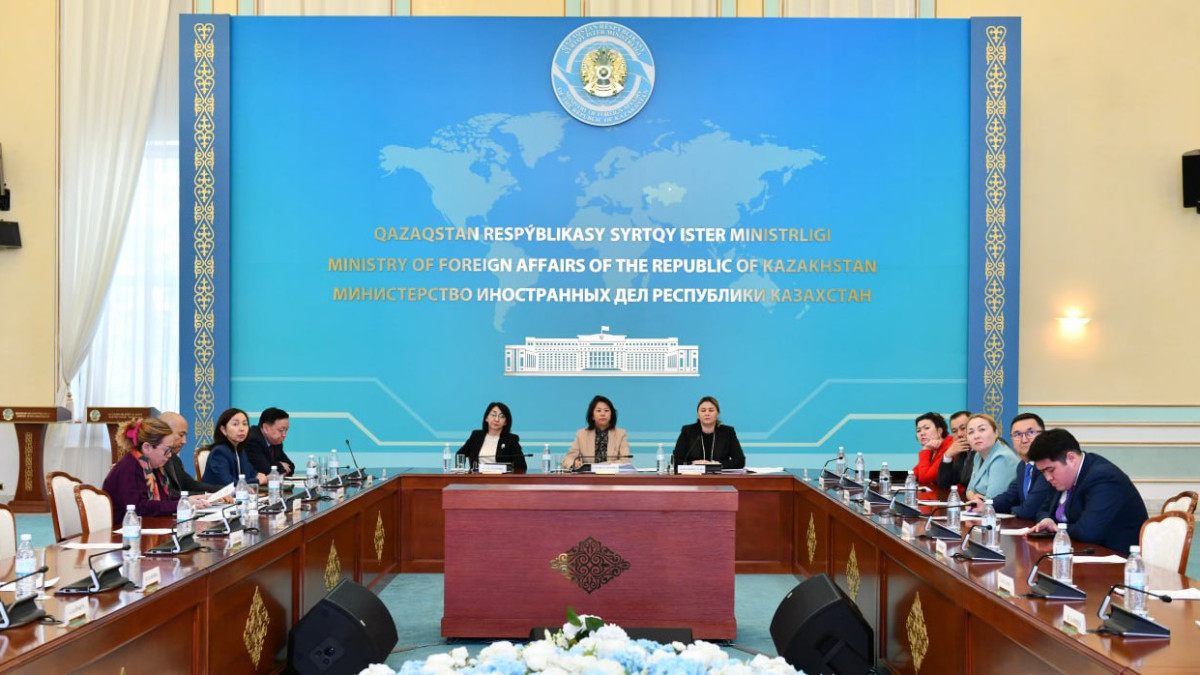
Issues of access to justice and approaches to further development of civil society discussed at Kazakh FM

EL.KZ Информационно-познавательный портал
The Ministry of Foreign Affairs of the Republic of Kazakhstan held a regular meeting of the “Dialogue Platform on the Human Dimension” Consultative and Advisory Body, chaired by Ambassador-at-Large Alua Nadirkulova, El.kz cites MFA.
During the meeting, as the main topics of discussion were the issues of access to justice, measures to implement the recommendations of the UN Committee within the framework of the International Covenant on Economic, Social and Cultural Rights and approaches to the further development of civil society in the country.
Representatives of the Constitutional Court, the Judicial Administration, interested ministries, Kazakhstan human rights NGOs, as well as guests of the site – representatives of the United Nations Development Program, the Office of the United Nations High Commissioner for Human Rights, the Representative Office of the European Union in the Republic of Kazakhstan attended event as participants.
In her speech, Nadirkulova noted that over the years the platform has become a real example of an open and sustainable dialogue between the Government and civil society in the framework of fulfilling international obligations. She also noted the importance of the political, economic and social reforms initiated by the Head of State within the framework of the Human Rights and Rule of Law Plan approved by him on December 8, 2023.
During the meeting, Deputy Head of the Staff of the Constitutional Court Yerlan Saparov noted that the supremacy of the Constitution, the protection of human rights and freedoms depend on an adequate legal response to emerging challenges and the legality of decisions of state bodies. As it was noted, citizens can directly apply to the Constitutional Court with applications for the recognition of illegal certain norms that, in their opinion, contradict the principles of the Basic Law. Saparov also drew attention to the fact that the institutional formation of the Constitutional Court, the formation of its practice, the expansion of citizens access to constitutional control, the granting of the Prosecutor General and the Ombudsman for Human Rights the right to raise the issue of the constitutionality of normative legal acts, the new format of their interaction with the branches of government naturally require further improvement of legislation.
In turn, the Head of the International Relations Department of the Judicial Administration of the Republic of Kazakhstan Shakir Shayakhmetov informed about the systemic changes to strengthen the independence of judges, simplify the judicial process and improve court management aimed at strengthening citizens trust and improving access to justice.
Within the framework of the second question the Director of International Cooperation Department of the Ministry of Labor and Social Protection of Population of the Republic of Kazakhstan Saadat Assanseitova shared information on the implementation of the recommendations of the UN Committee within the framework of the International Covenant on Economic, Social and Cultural Rights.
Special attention was paid to the issue of providing housing for the most needy and socially vulnerable groups of the country’s population. In this regard, Deputy Chairman of the Committee for Construction and Housing of the Ministry of Industry and Construction Kanat Mynbayev elaborated on the work carried out by the Ministry to improve the current housing legislation. Thus, the bill on reforming housing policy, which provides for new approaches to the distribution of housing among all needy citizens and revision of benefits and priorities for certain categories of citizens, is under consideration of the Mazhilis of the Parliament.
During the meeting, Vice-Minister of Justice Botagoz Zhakselekova shared novelties provided in the bill on intellectual property, aimed at strengthening the protection of intellectual property rights and creating conditions for the development of culture and, in general, the creative potential of citizens. In addition, it was noted about the ongoing work to improve access of visually impaired persons to published works, their professional development and social integration.
In turn, Asiya Khairulina, Chairperson of the Board of the NGO League of Women of Creative Initiative, drew attention to some problems in ensuring cultural rights in the country. As the speaker noted, the concept of cultural human rights today requires special legal clarification and regulation, as well as clarification of specific parameters of their content.
During the discussion of the third issue of the agenda, the Chairperson of the Committee for Civil Society Affairs of the Ministry of Culture and Information of the Republic of Kazakhstan Gulbara Sultanova informed about the ongoing work to develop approaches to further development of civil society. Thus, it is planned to conduct a number of activities to monitor the implementation of the Concept of Civil Society Development with the involvement of experts, sociological research organizations and public discussions with various stakeholders, including visits to the regions.
In general, the discussion of the agenda was open and constructive, and representatives of government agencies and NGOs listened to problematic issues and gave practical recommendations for systematic improvement of the legislative framework in the field of human rights.

